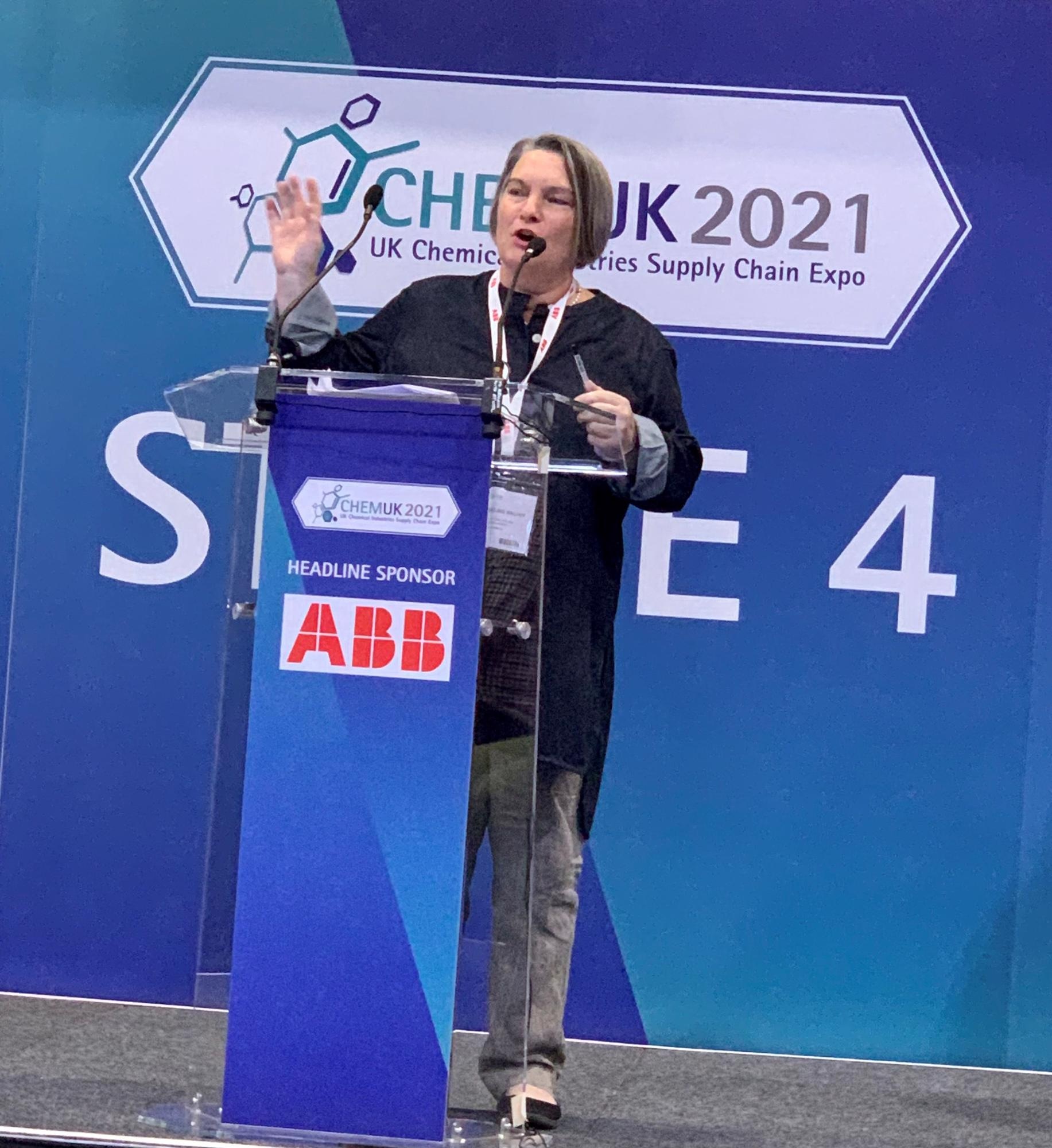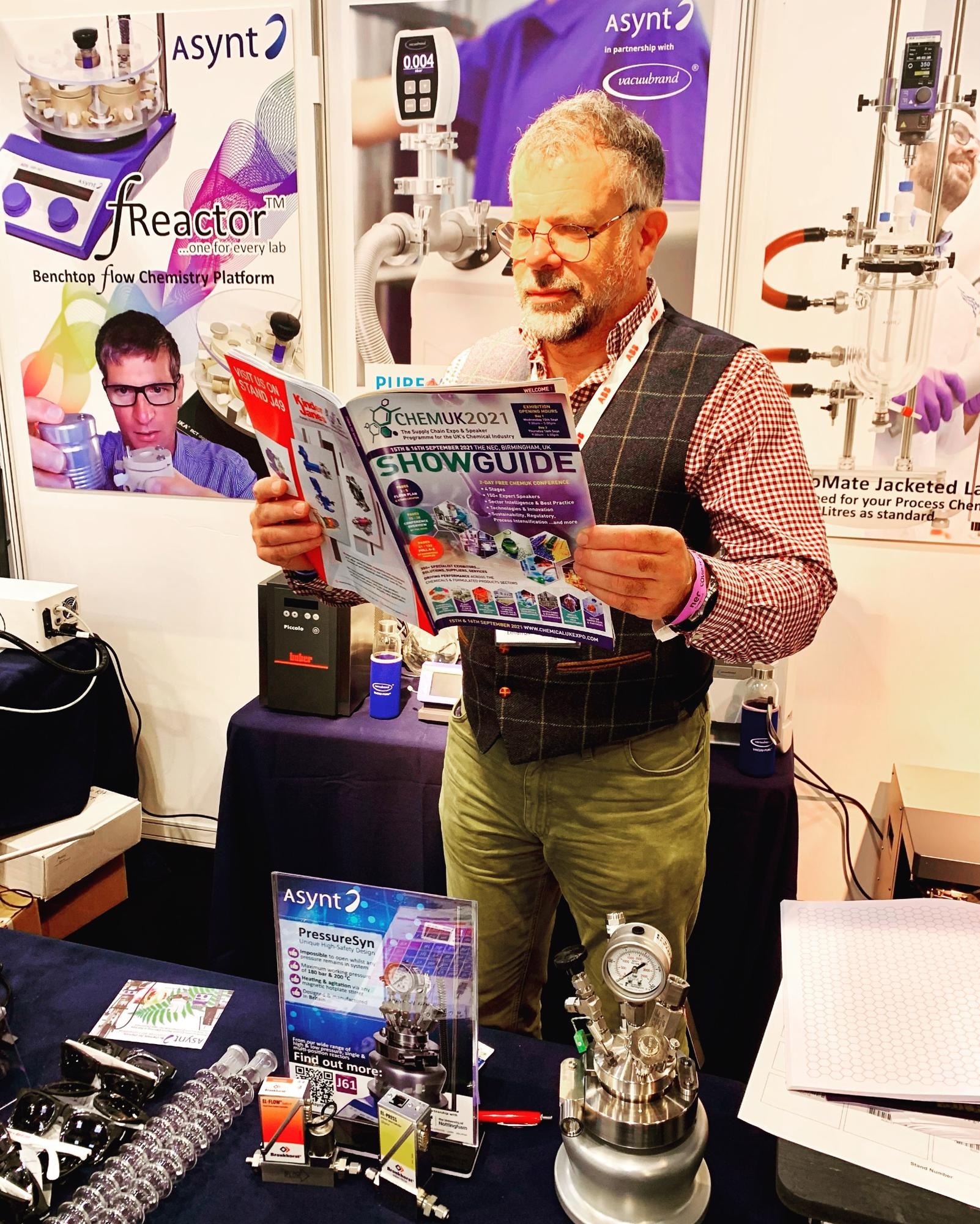Ahead of their talk on green chemistry and profitability in laboratory research at ChemUK 2022, AZoM spoke with Jacqueline Balian from Gambica and Martyn Fordham from Asynt about encouraging sustainability in the chemical industry.
Please can you introduce yourself and your professional background, as well as your current role?
Jacqueline Balian (JB): Hi, my name is Jacqueline Balian. I’ve worked in professional associations for many years, mainly in the energy efficiency field, and I also spent an interesting period running the Renewable Heat Incentive for the Government. I am now head of the lab sector at GAMBICA, a small UK trade association for companies in the lab, automation, and testing industries.
Martyn Fordham (MF): I'm Martyn Fordham, Managing Director at Asynt. I have been involved in the custom design of chemistry apparatus since 1983.
What are some of the advantages that come with encouraging sustainability in a lab environment?
JB: Labs are enormous users of energy and substantial producers of plastic waste but are also at the forefront of finding solutions to our present sustainability problems. They present the epitome of the ticklish issue of what to do when you have to keep increasing your outputs while reducing your consumption. But they also have the most motivated and able people who can and will engage with the problem and find solutions – it’s what they are all about.
The advantages for the labs themselves are satisfying staff demand, satisfying client demand, and improving their bottom line.
MF: Saving money and increasing efficiencies are often the results of sustainable technologies for synthesis laboratories.
The Gambica trade association will be represented by Asynt at the ChemUK conference in May. What does Asynt do and how is it implementing strategies toward greener lab work?
MF: We design and manufacture apparatus for research chemistry laboratories. The majority of our products have an added advantage in terms of increasing sustainability as well as some significant safety improvements.
Claim your FREE Visitor Badge for ChemUK
You will be conducting a talk called ‘The Lean, Green, Profitability Scene’ at ChemUK. Could you describe the relationship between green chemistry and profitability?
JB: We have a big, big task ahead of us to avoid a climate catastrophe and limit the effects of what we have already done. We cannot afford to have any sector lag behind in the race to zero, but important, heavy energy users like R&D labs need to lead the way. They need to be able to purchase equipment and consumables and carry out their operations so as to reduce the burden they place on the planet, but the flip side of that is that everything they save by doing so, goes straight onto the bottom line.

Jacqueline presenting at ChemUK 2021
It’s like lean engineering, sustainable laboratories will improve their processes and in turn cost less and therefore increase profitability. Better designed and run experimentation will reduce time to market and improve profits and the excellent work being done on the automation of laboratories will certainly also allow labs to cut down on unnecessary waste.
Perhaps one of the greenest innovations however is the improved use of LIMS and other data systems to improve the use of existing data to cut down on unnecessary repetition of work and identify trends to help hone processes by means of modeling rather than experimentation. This is not only a greener option, but it also cuts costs too.
MF: To successfully introduce sustainable improvements to a laboratory, these improvements should also reduce running costs and improve the working environment for the chemist.

Martyn at ChemUK 2021
What kinds of technologies can be used to increase the sustainability of lab processes in the research chemistry laboratory?
JB: In our session, delegates will hear about technologies that replace plastics with sustainable alternatives, about products that reduce the need for water or which inherently produce less waste, they will also hear about new markets which may be opening up to them in the re-use of waste materials.
MF: Waterless condensers (our CondenSyn) reduce water consumption. As well as these, lower power usage heating tools (our DrySyn), photochemistry (enabling research into using more sustainable solvents, particularly important when scaled up), flow chemistry tools (similar benefits for photochemistry) and products that maximize recyclable materials such as aluminum can be employed.
With the halt of in-person events such as ChemUK over the last two years due to Covid-19, how important are conferences like these for stressing the importance of sustainability in industry?
JB: People are certainly keen to get out and about and events like this can provide inspiration, excitement, interest, and a break from the old routine. But moves to sustainability are not straightforward - often people do not understand the first steps to take. Events like Chem UK can help. Leadership is hugely important in sustainability. Events like Chem UK can help provide the inspiration and ideas people need to lead their companies into a green transition.
MF: The exhibition element is key for scientists to see what is new to the market in terms of sustainable, cost-saving, and time-saving tools.

About Jacqueline Balian and Martyn Fordham
 Martyn has been working in the Chemistry field for over thirty years, going on to form Asynt Ltd in 2003. With a custom glass blowing background, Martyn has been involved in many product development programs, both for previous employers and now of course Asynt and Uniqsis of which Martyn is also founder and CEO. Martyn is head of product development within Asynt and is keen to expand the portfolio of products available with innovative and useful new tools for the laboratory.
Martyn has been working in the Chemistry field for over thirty years, going on to form Asynt Ltd in 2003. With a custom glass blowing background, Martyn has been involved in many product development programs, both for previous employers and now of course Asynt and Uniqsis of which Martyn is also founder and CEO. Martyn is head of product development within Asynt and is keen to expand the portfolio of products available with innovative and useful new tools for the laboratory.

Jacqueline is head of the lab, test and measurement sectors at GAMBICA which she joined after a career spanning journalism, running energy efficiency and renewable energy schemes and working in professional bodies.
Disclaimer: The views expressed here are those of the interviewee and do not necessarily represent the views of AZoM.com Limited (T/A) AZoNetwork, the owner and operator of this website. This disclaimer forms part of the Terms and Conditions of use of this website.
Ahead of their talk on green chemistry and profitability in laboratory research at ChemUK 2022, AZoM spoke with Jacqueline Balian from Gambica and Martyn Fordham from Asynt about encouraging sustainability in the chemical industry.
Please can you introduce yourself and your professional background, as well as your current role?
Jacqueline Balian (JB): Hi, my name is Jacqueline Balian. I’ve worked in professional associations for many years, mainly in the energy efficiency field, and I also spent an interesting period running the Renewable Heat Incentive for the Government. I am now head of the lab sector at GAMBICA, a small UK trade association for companies in the lab, automation, and testing industries.
Martyn Fordham (MF): I'm Martyn Fordham, Managing Director at Asynt. I have been involved in the custom design of chemistry apparatus since 1983.
What are some of the advantages that come with encouraging sustainability in a lab environment?
JB: Labs are enormous users of energy and substantial producers of plastic waste but are also at the forefront of finding solutions to our present sustainability problems. They present the epitome of the ticklish issue of what to do when you have to keep increasing your outputs while reducing your consumption. But they also have the most motivated and able people who can and will engage with the problem and find solutions – it’s what they are all about.
The advantages for the labs themselves are satisfying staff demand, satisfying client demand, and improving their bottom line.
MF: Saving money and increasing efficiencies are often the results of sustainable technologies for synthesis laboratories.
The Gambica trade association will be represented by Asynt at the ChemUK conference in May. What does Asynt do and how is it implementing strategies toward greener lab work?
MF: We design and manufacture apparatus for research chemistry laboratories. The majority of our products have an added advantage in terms of increasing sustainability as well as some significant safety improvements.
Claim your FREE Visitor Badge for ChemUK
You will be conducting a talk called ‘The Lean, Green, Profitability Scene’ at ChemUK. Could you describe the relationship between green chemistry and profitability?
JB: We have a big, big task ahead of us to avoid a climate catastrophe and limit the effects of what we have already done. We cannot afford to have any sector lag behind in the race to zero, but important, heavy energy users like R&D labs need to lead the way. They need to be able to purchase equipment and consumables and carry out their operations so as to reduce the burden they place on the planet, but the flip side of that is that everything they save by doing so, goes straight onto the bottom line.

Jacqueline presenting at ChemUK 2021
It’s like lean engineering, sustainable laboratories will improve their processes and in turn cost less and therefore increase profitability. Better designed and run experimentation will reduce time to market and improve profits and the excellent work being done on the automation of laboratories will certainly also allow labs to cut down on unnecessary waste.
Perhaps one of the greenest innovations however is the improved use of LIMS and other data systems to improve the use of existing data to cut down on unnecessary repetition of work and identify trends to help hone processes by means of modeling rather than experimentation. This is not only a greener option, but it also cuts costs too.
MF: To successfully introduce sustainable improvements to a laboratory, these improvements should also reduce running costs and improve the working environment for the chemist.

Martyn at ChemUK 2021
What kinds of technologies can be used to increase the sustainability of lab processes in the research chemistry laboratory?
JB: In our session, delegates will hear about technologies that replace plastics with sustainable alternatives, about products that reduce the need for water or which inherently produce less waste, they will also hear about new markets which may be opening up to them in the re-use of waste materials.
MF: Waterless condensers (our CondenSyn) reduce water consumption. As well as these, lower power usage heating tools (our DrySyn), photochemistry (enabling research into using more sustainable solvents, particularly important when scaled up), flow chemistry tools (similar benefits for photochemistry) and products that maximize recyclable materials such as aluminum can be employed.
With the halt of in-person events such as ChemUK over the last two years due to Covid-19, how important are conferences like these for stressing the importance of sustainability in industry?
JB: People are certainly keen to get out and about and events like this can provide inspiration, excitement, interest, and a break from the old routine. But moves to sustainability are not straightforward - often people do not understand the first steps to take. Events like Chem UK can help. Leadership is hugely important in sustainability. Events like Chem UK can help provide the inspiration and ideas people need to lead their companies into a green transition.
MF: The exhibition element is key for scientists to see what is new to the market in terms of sustainable, cost-saving, and time-saving tools.

About Jacqueline Balian and Martyn Fordham
 Martyn has been working in the Chemistry field for over thirty years, going on to form Asynt Ltd in 2003. With a custom glass blowing background, Martyn has been involved in many product development programs, both for previous employers and now of course Asynt and Uniqsis of which Martyn is also founder and CEO. Martyn is head of product development within Asynt and is keen to expand the portfolio of products available with innovative and useful new tools for the laboratory.
Martyn has been working in the Chemistry field for over thirty years, going on to form Asynt Ltd in 2003. With a custom glass blowing background, Martyn has been involved in many product development programs, both for previous employers and now of course Asynt and Uniqsis of which Martyn is also founder and CEO. Martyn is head of product development within Asynt and is keen to expand the portfolio of products available with innovative and useful new tools for the laboratory.

Jacqueline is head of the lab, test and measurement sectors at GAMBICA which she joined after a career spanning journalism, running energy efficiency and renewable energy schemes and working in professional bodies.